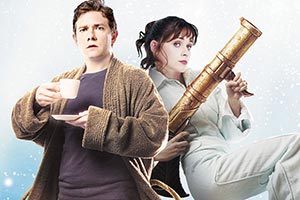Exploring The Hitchhiker's Guide To The Galaxy film - Part 2
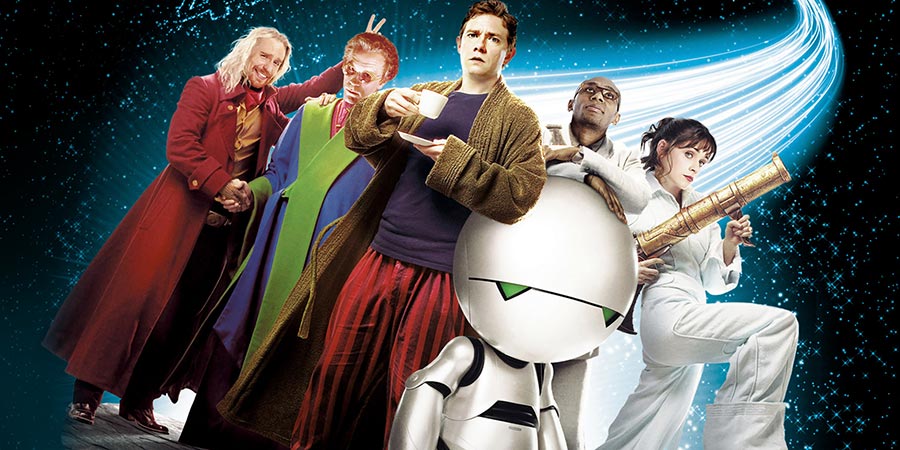
The story so far, as explained in the first part of this article: Since the early eighties Douglas Adams had spent many years of his life striving for a Hitchhiker film, but after continually butting heads with producers who thought Slartibartfast was pointless and felt that in some ways '42' was a bit disappointing, he came unstuck. Yet, he never fully gave up on his dreams. Things were looking reasonably positive as a new millennium began, and then, suddenly, at the tragically young age of 49, Douglas Adams died of a heart attack. There was only one thing to do... they had to make this film... for Douglas. So, by hook or by crook, a Hitchhiker movie was now definitely happening...
When the film triumphantly arrived in the April of 2005, it was an extremely emotional moment. To finally be able to sit in the cinema and prepare to bear witness to Hollywood's take on The Hitchhiker's Guide to The Galaxy was nothing short of miraculous.
Perhaps fitting with the entire ethos motivating the film, our story begins in a majestic and ethereal way. Heavenly choral music and images of dolphins provide a healing and peaceful start. Then, Stephen Fry, as our voice of the book, begins with the words:
'It's an important and popular fact that things are not always what they seem...'
A close friend of Douglas and the executive producer of the film, Robbie Stamp, indicated that this was a very significant first line. Perhaps this line explained that in order to be faithful to Douglas's vision of the Hitchhiker's film, they had to be unfaithful to the source material... if that sounds strange, then let's allow Douglas Adams to explain:
"What I'm trying to do with the film is use a completely different selection process to that which went into the TV series. We are trying to show the stuff you didn't see in the TV series. So, if you go back to the book and find all the things not in the TV series, that's the film."
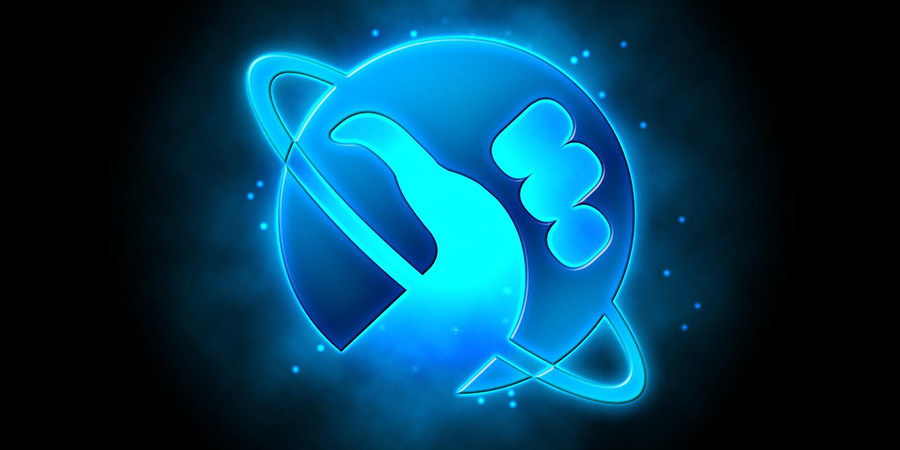
Without Douglas's original first draft screenplay, it is impossible to know how far he strayed from his own source material; in a way, he did outline his vision in the Hitchhiker's Guide To The Galaxy video game, which managed to have the same story, despite occasionally drifting off into different directions. However, it is important to remember that this discourse was all happening back in the mid-eighties, when Douglas was keen to give Arthur Dent's galactic adventures a fresh edge, perhaps fearing that the Hitchhiker brand could become stale without one. But, as the years marched on, Adams found himself more in tune with the idea that the proposed film should in fact follow the original plot, in order to both update the visuals of the TV series and introduce a whole new generation to his story.
One thing fans of the writing of Douglas will know all too well, is that he always liked to change things slightly with each adaptation. Despite his new resolve to remain close to what had gone before, with every new screenplay he wrote, Douglas apparently introduced something brand new into the mix. This wouldn't have been such a problem if he had lived to see his film realised... ultimately, it was Douglas Adams's untimely passing that changed everything, including our perspective on Adams's material. As people picked up the books, radio series and the TV series anew, appreciating them in a different light in the wake of his death, these original versions of the story became even more sacred and revered than ever before.
Meanwhile, a wealth of new material from Douglas presented itself in the many rejected film scripts from down the years. Karey Kirkpatrick was the screenwriter tasked with patchworking together the best elements from all former drafts to realise the ultimate version of the film. In the book, The Making of The Hitchhiker's Guide to the Galaxy, it was revealed that Douglas had struggled to make his story work by attempting to abide by the 'three-act structure' rule of screenwriting; it just wasn't a story that fitted very easily into the run-time of a movie, even with our heroes now ending their journey on Magrathea (as opposed to prehistoric Earth). Simply put, it had been felt that the story had to have something in between Zaphod wanting to get to Magrathea and just getting there immediately after the crew's mishap with the bowl of petunias and the Sperm Whale. So, Douglas had devised the entire Viltvodle VI sequence, starring John Malkovich as Humma Kavula (the space pirate turned preacher) and Zaphod's nemesis.
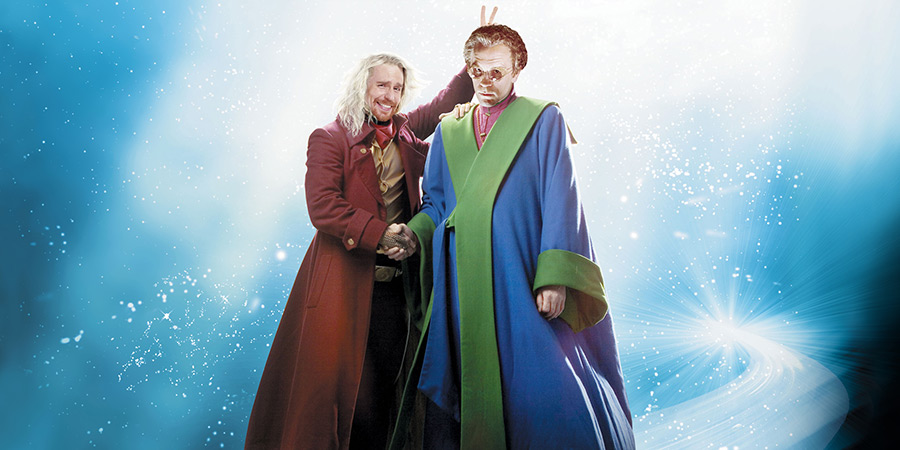
This is the most confusing element of the big-screen Hitchhiker project. In all honesty, a straightforward condensed TV/radio series/book adaptation might have played better with fans than the resulting film, yet this would have meant throwing out Douglas's years of hard work trying to make a new vision of Hitchhiker for the silver screen... it was quite the dilemma, to try and make both these desires hang together was going to take a lot of effort and screen-time. Director Garth Jennings explained his initial reaction to watching the rough cut of the film:
"It was two-and-a-half hours long, and it fell to pieces every two to three minutes... but what I couldn't get over was that it was what we had set out to make. It was the movie we'd all gone to try and make work."
For Hitchhiker's theatrical release the run-time had to be cut down to 100 minutes. Long have fans lobbied for a chance to see the full cut, but currently this seems unlikely to happen.
With the film's run-time now cut down considerably, it needed a strong identity to really make an impact. This is something the movie has in spades, not least in the song which has arguably become the film's greatest contribution to the world of Hitchhiker. We can all hum it, 'So long and thanks for all the fish' as an intro, it was a completely out -of-the-box idea that was totally in tune with Douglas's plans to turn everything on its head. The trio of composer Joby Talbot, director Garth Jennings and producer Nick Goldsmith had devised an introduction to the proceedings with an air of a 1950s musical, one that was so joyous, so silly, so Python, that nobody, but nobody, could fail to get spirited away with it.
So, who on earth did they cast? Who could you get for Arthur Dent? Douglas had suggested Hugh Laurie. Then later, as the film went into production, David Mitchell was heralded as the obvious candidate to give us a Simon Jones style Arthur Dent. But we have to remember, this was the early 2000s, the hottest comedic property around was The Office. It was a small-time Britcom that had achieved worldwide success, and not since Hitchhiker or Red Dwarf had anybody seen anything like it. Therefore, Martin Freeman's casting assured international appeal, plus, he was totally believable as an authentic tea-loving Brit. Not only that, he had proved how easily he could fit into a quirky love story, as the Tim and Dawn romance plot (which he performed effortlessly alongside Lucy Davis in The Office) had unintentionally threatened to overshadow David Brent himself.

On the other hand, a romance plotline being introduced to The Hitchhiker's Guide To The Galaxy is often the biggest hang-up people have with the film. Fans who were perhaps only familiar with the TV series, or the first couple of radio series, would no doubt have felt that Disney had come along and haphazardly shoehorned a love story into the plot. However, there is no doubt that Douglas's material offered ample opportunity to make this happen, he had introduced the idea of a Trillian/Arthur romance into his earlier film scripts. In the only one that has leaked into the public domain, we see a romantic tension between the pair, although it was subtle. In his fourth novel however, the idea itself was not so subtle. The driving plot saw Arthur fall in love with the girl who was mentioned on the very first page of that first iconic book. She was the girl in the café in Rickmansworth (named Fenchurch for confusing reasons). If anything gave Disney the green-light to go full throttle on an Arthur Dent romance plotline then it was this.
Enter Zooey Deschanel (a big Hitchhiker fan) who gave us a performance combining both Fenchurch and Trillian's best elements. We first meet her on-screen at the infamous cocktail party where Trillian ditched Arthur for the guy from a different planet. This scene comes a lot earlier than it did before in the story. Initially, it was a plot device to show us that, as with all great sitcom protagonists, Arthur Dent is a complete loser. But now, we witness this scene almost at the start, and being unceremoniously dumped is actually the main thing that is getting Arthur down. He sits in the pub with Ford nursing his grievances, and it's Trillian (or Trisha) that's really bothering him... not that his house is being knocked down.
This highlights the overall approach this film took to the characterisation of Arthur. Director Garth Jennings explained his vision:
"We knew we wanted to expand on the human story and we're fans of films like The Apartment. We thought Arthur was like the young Jack Lemmon in that film: slightly stuck in his ways, hypochondriac, neurotic, someone who can be really stupid and irritating and yet completely sympathetic. Martin Freeman was one of our first thoughts for the role."
When an actor has embodied a character in the way that Simon Jones embodied Arthur Dent, it's almost impossible to know how to approach the role afresh. So, in the same way that Doctor Who fundamentally changes each time a new actor takes over, they went for something completely different. This is understandable. However, when you watch Arthur lie in front of the bulldozers and realise that tonnes of beloved dialogue was cut from this famous scene, it feels gut-wrenching. This is especially true for fans that grew up with the TV series, which really squeezed every last comedic drop from Arthur's encounter with Mr Prosser (short of dressing him up in a Genghis Khan hat, as he had in the book).
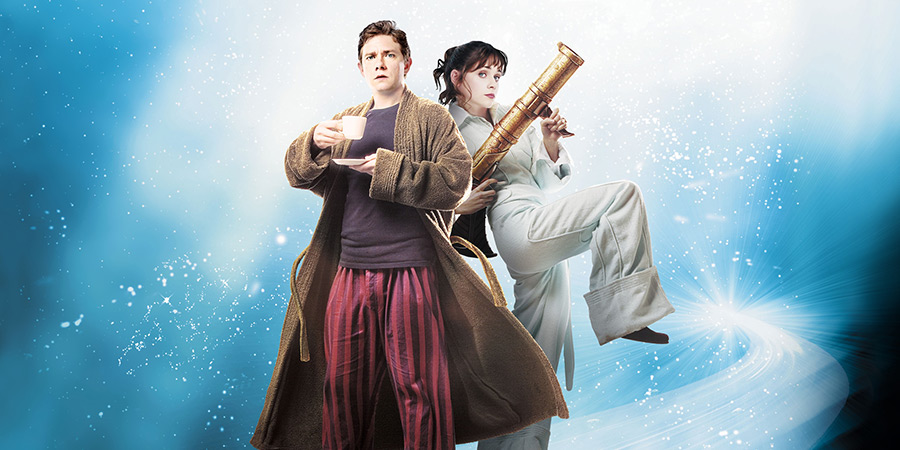
It's easy to feel something was missed when you see Ford zipping in with a trolley full of beer to distract the workers instead. But consider this, most people of the eighties became familiar with the LP release of Hitchhiker - to save time on the record, this treasured scene was cut, as it was here, to its bare bones, in both cases it was to save time for, well, everything else.
Rap artist turned actor Mos Def took on the role of Ford. It was great to see some diversity in the casting, but as was the nature of this version of the tale, Ford's friendship with Arthur became side-lined as the love triangle developed between Trillian, Arthur and Zaphod. In the epic two-and-a-half hour cut there may have been a bit more for him to do, but often we see him just tagging along as Sam Rockwell's sparkling interpretation of Zaphod struts across the screen. This update of Zaphod was less 1980s cool-cat and more 1990s Rock God. Although some were unhappy with the way his second head was handled (it appeared from his neck occasionally, as opposed to being permanently on display), as a modern American interpretation of the character, Rockwell was pretty much perfect.
In particular, the scene featuring the Point of View Gun was a real moment for Zaphod. The gun was one of Douglas's ideas from a former script, like the Total Perspective Vortex but on a much smaller scale. According to the Guide, 'If you point it at someone and pull the trigger, they instantly see things from your point of view'. So, Trillian repeatedly 'zaps' Zaphod with it, allowing him to relay to himself, and everybody else, her true feelings. It was a clever, well-acted scene that gave Zaphod and Trillian's relationship some real emotional depth, a perfect example of Douglas's unused ideas working in perfect harmony with the new material. Although some would dispute that Zaphod could actually possess any emotional depth, even after being shot with the gun.
One aspect of the film that delighted most, if not all fans was the spectacle of Slartibartfast's factory floor tour with Arthur. It was the one thing the 1981 TV series and the radio series couldn't give us in its full majesty. This was the big scene that needed to be right, it needed to blow Arthur away and give us something extra special. It took a year and a half to devise the full sequence, filled with whizzing cherry pickers exploring the many wonders of the world being 'put back' featuring Bill Nighy at the helm, giving us a little bit of John Le Mesurier style cool indifference. He was perfectly cast as Slartibartfast - who did finally get to be in the film, after Adams had been told by previous producers to drop him. He also has his name (also once dropped by Adams on request), and he gets to say his best line:
Slartibartfast: Perhaps I'm old and tired, but I think that the chances of finding out what's actually going on are so absurdly remote that the only thing to do is to say, "Hang the sense of it" and keep yourself busy. I'd much rather be happy than right any day.
Arthur Dent: And are you?
Slartibartfast: Ah, no. Well, that's where it all falls down, of course.
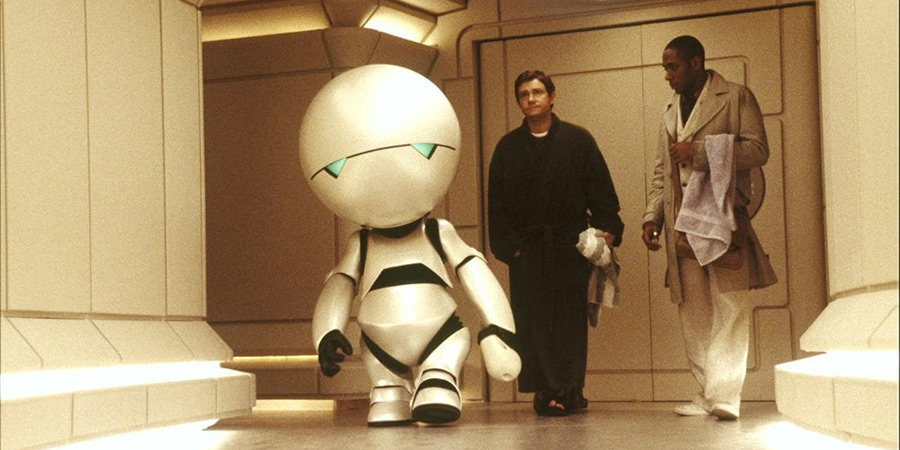
Yet the ultimate scene stealer was still Marvin. Literally designed with the brain the size of the planet, he was supported internally by Warwick Davis and vocally by Alan Rickman. Such was the love felt for the character that he became the overall hero in the final battle with the Vogons. Marvin's beautiful, sleek design was brought to life by the Jim Henson Creature Shop. The decision to use real puppetry for every alien in the film, as opposed to CGI, was a good one, as by now, any computer generated Vogons from the mid-2000s would be looking fairly dated. Instead, the puppetry gave an old-school retro appearance, which was a nice tribute to the fact that Adams and Henson had become friends in the mid-eighties, promising to work with each other one day - this sadly didn't come about for either in life, yet meaningfully it did in death.
Jim Henson died in 1990 aged just 53. In the aftermath, his son, Brain Henson 'took on' The Muppets, and with the help of an incredibly talented team they made the ever-popular Muppet Christmas Carol. It was a very similar situation to that which the production team of Hitchhiker had found themselves in. They were making a film for a person who wasn't there, yet was at the very heart of what they were doing, at times doubting if it could come together at all without them. Jim Henson embodied The Muppets just as Douglas Adams embodied Hitchhiker. Co-writer, Karey Kirkpatrick explained:
"It has been a movie of a singular vision. There was no movie-making committee of writers. The core team was very small and I think it shows. We did need to amend and create stuff, but the goal was always to do something very Douglassy. That inspired the creation, so everything felt like it belonged in the universe that he created. Because Douglas had died and there was this overwhelming feeling that we wanted to do him proud, everybody checked their egos at the door. Nobody was out to grab any credit for themselves - there was a higher cause at play."
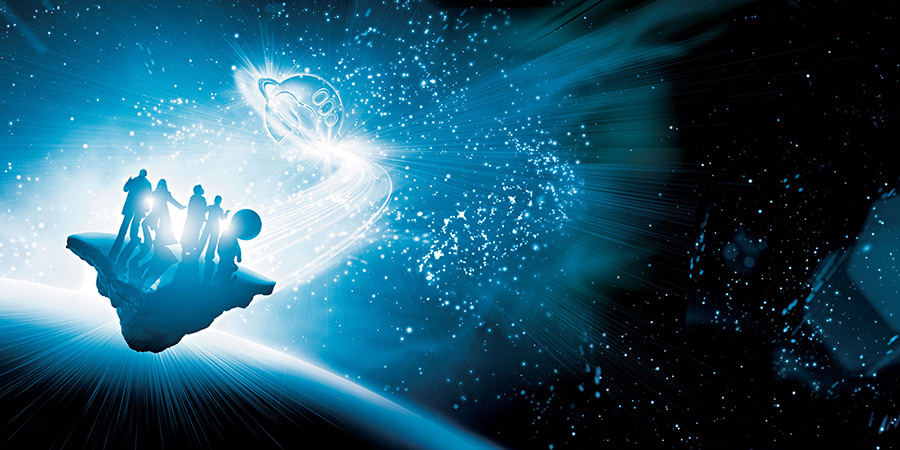
The perception of Douglas Adams turned slowly over the years from dotty author of humorous books to a true craftsman - posthumously he achieved the status of classic author and true genius. He had the ability to hang plot threads together that were often never followed up, yet it didn't seem to matter, so rich were the tapestries of his mere paragraphs and sentences. He had let his imagination run free, allowing his Hitchhiker books to be... whatever he wanted them to be, funny, serious, philosophical, beautiful, satirical. It's not clear how he managed to achieve a kind of harmony in this discord, but somehow, he always did.
What does the future hold for The Hitchhiker's Guide To The Galaxy? Who can tell?
With Netflix and Disney+ TV series becoming the new blockbusters, in 2022 Stephen Fry reflected that the time might be right to revisit Hitchhiker again with a brand-new TV series. Plans were ready to go ahead in 2019, but we've heard no more about it since. 'Typical', Hitchhiker fans would no doubt chime (in the tones of Marvin) but whatever happens we should remember that Douglas Adams was a man that never gave up on his dreams, he lay in a field in Innsbruck, looked up at the stars, and imagined a Hitchhiker's Guide To The Galaxy, and then he shared his vision with the world. On this towel day we could all do with being a bit more Douglas.
Help us publish more great content by becoming a BCG Supporter. You'll be backing our mission to champion, celebrate and promote British comedy in all its forms: past, present and future.
We understand times are tough, but if you believe in the power of laughter we'd be honoured to have you join us. Advertising doesn't cover our costs, so every single donation matters and is put to good use. Thank you.
Love comedy? Find out more
